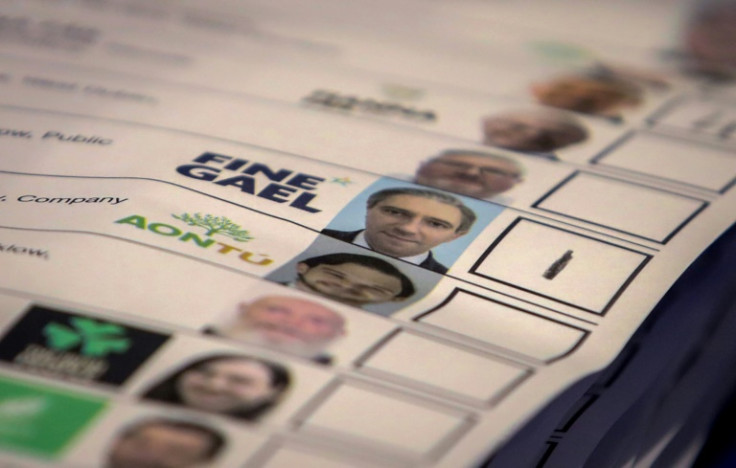Vote counting in Ireland’s general election began on Saturday as an exit poll indicated a tight finish between the three main parties, with the incumbent centre-right coalition most likely to form the next government.
After voting concluded on Friday, the exit poll indicated that the leftist-nationalist Sinn Fein, the main opposition party, narrowly led with 21.1 percent of the vote.
But neck and neck on 21 percent was the centre-right Fine Gael whose leader is the outgoing Prime Minister Simon Harris.
Fine Gael’s centre-right partner in the outgoing coalition — Fianna Fail, led by Deputy Prime Minister Micheal Martin — were slightly further back in third with 19.5 percent.
EU member Ireland’s proportional representation system sees votes of eliminated candidates redistributed during multiple rounds of counting, delaying a final result for days.
Partial returns on Saturday showed Fianna Fail outperforming its exit poll placing and nudging ahead in the race to win the largest vote share.
The experienced Martin, 64, said after his election in Cork that it was “very early days but we do see a route to a very strong finish” in the election.
Harris, 38, told reporters in his home constituency of Wicklow that he was “cautiously optimistic” about the result, but that it was “still too hard to call” who will emerge as the largest party.
“Forming a government will depend on two of the three (main parties) being able to cooperate with one another,” Lisa Keenan, a political scientist at Trinity College Dublin, told AFP.
Fine Gael and Fianna Fail are “in the driving seat to reestablish (a) coalition” in the new 174-seat lower chamber of parliament, said the Irish Times newspaper.
During the campaign the centrist partners ruled out entering a coalition with Sinn Fein.
But Sinn Fein’s leader Mary Lou McDonald, 55, told reporters in Dublin that her party has been given “a powerful and strong mandate” in the election.
“We will be very, very actively pursuing entrance into government,” she said, adding that Sinn Fein will “talk to other parties of the left” about a potential coalition partnership.
At the last general election in 2020, the pro-Irish unity Sinn Fein — the former political wing of the paramilitary Irish Republican Army — were the most popular party but could not find willing partners.
That led to weeks of horsetrading, ending up with Fine Gael, which has been in power since 2011, agreeing a deal with Fianna Fail.
During the last parliamentary term, the role of prime minister rotated between the Fianna Fail and Fine Gael leaders.
Fine Gael and Fianna Fail’s supporters are also “increasingly willing to transfer from one to the other”, as the count rounds progress, Keenan told AFP.
Smaller opposition parties like the Social Democrats, and Labour, as well as non-aligned independent candidates could be in the mix for coalition talks if sought by the main parties to make up an 88-seat majority in the Dail.
The three-week campaign, launched after Harris called a snap election on November 8, was marked by rancour over housing supply and cost-of-living crises, and public spending.
Harris, who became Ireland’s youngest-ever taoiseach (prime minister) when he took over in April, held a solid lead entering the campaign.
Both centre-right parties stressed their pro-business credentials and said that returning them to power would ensure economic stability.
But Fine Gael lost ground, in particular after Harris, whose campaign centred on his energetic personality and social media savvy, was seen in a viral clip appearing rude and dismissive on the campaign trail.
The exit poll revealed “no enthusiasm for the government”, Eoin O’Malley, a political scientist at Dublin City University, told AFP.
“But neither is there any enthusiasm for the opposition parties,” he said.
IT worker Kevin Barry, 41, told AFP after voting on Friday that the centrist coalition was “responsible for the mess that we are in over housing, but the alternative is worse”.
But it rallied on the back of a campaign heavily focused on housing policy and claims it is the only alternative to Fine Gael and Fianna Fail, which have swapped power since Irish independence from Britain in 1921.
Sinn Fein has “broken the political mould here in this state: two party politics is now gone”, said McDonald on Saturday.

AFP
















